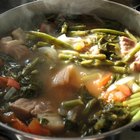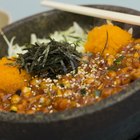
Miso soup is one of the most popular dishes in Japanese homes and sushi restaurants around the world. This light, simple soup has a blend of salty and pungent flavors and serves as a great base for the addition of a variety of solid ingredients. Although you can easily make vegan-friendly versions, miso soup is typically prepared with fish or other non-vegan stocks.
Traditional Recipes
Miso soup traditionally consists of two main ingredients. The first is miso, a paste made from boiled or steamed soybeans, salt and a fermented food called "koji." Koji is most commonly fermented rice, but can also be made with fermented barley or soybeans. The second is katsuobushi dashi, a soup stock made from water, kelp and dried, fermented bonito or skipjack tuna fish shavings. As fish is one of the primary ingredients, traditional miso soup is not vegan-friendly.
Other Traditional Varieties
The most common traditional recipe for dashi involves the use of bonito or tuna fish. However, three other common recipes for dashi replace these fish shavings with other ingredients. Niboshi dashi is made with dried baby sardines and, as such, is not suitable for vegans. In contrast, the other two major varieties of dashi are vegan-friendly. Shiitake dashi replaces the fish in the original recipe with shiitake mushrooms, while kombu dashi is made solely with kelp and water.
Western Recipes
Outside of Japan, miso soup is typically made with instant dashi stocks. In addition to the four traditional varieties of dashi, Western sushi restaurants often use local soup stocks to make miso soup. One of these Western alternatives is suitable for vegans, as it replaces the dashi in traditional recipes with vegetable stock. However, chicken stock is the most common and suitable replacement for dashi in Western recipes. As most of these stocks are not vegan-friendly, you should always ask about the type of dashi used before ordering a bowl of miso soup.
Nutrition and Benefits
Most of the nutrition in miso soup comes from the miso paste. Miso contains very high concentrations of isoflavones, which contribute to bone health and may help to prevent osteoporosis. Like other fermented soybean products, miso is nutritionally dense and contains dietary fiber, protein, essential amino acids, antioxidants and essential trace minerals. One of the only nutritional drawbacks of miso is its extremely high sodium content, providing 26 percent of your daily intake in a 1-tablespoon serving.
Related Articles

Protein Content of Soy Beans

Difference Between Gumbo and Etouffee

Substitute for Light Cream in Cooking

Preservatives in Campbell's Soups

How to Cook Raw Tuna in Lemon

How to Soak Amaranth

Alternative to Cooking With Chicken ...

How to Make Sinigang

Vietnamese Diet

Cubic Zirconia Vs. White Spinel

What Is Vegetable Ghee?

Korean Food Nutritional Value

How to Make Fish Taco Sauce

Substitute for Gram or Besan Flour

How to Serve Ciabatta Bread

What Is Indian Flatbread Called?

Is Allantoin a Relative of the Lanolin ...

How to Make Crab Bisque

How to Make Homemade Liquid Rouge

How to Make Wasabi
References
- Hiroko's American Kitchen: Cooking with Japanese Flavors; Hiroko Shimbo
- The Vegetarian Resource Group: Miso Soup: It's Japanese Soul Food
- Linus Pauling Institute: Soy Isoflavones
- Soyfoods Association of North America: Soy Information: Miso
Writer Bio
Matthew Lee has been writing professionally since 2007. Past and current research projects have explored the effect of a diagnosis of breast cancer on lifestyle and mental health and adherence to lifestyle-based (i.e. nutrition and exercise) and drug therapy treatment programs. He holds a Master of Arts in psychology from Carleton University and is working toward his doctorate in health psychology.
Photo Credits
Ryan McVay/Photodisc/Getty Images